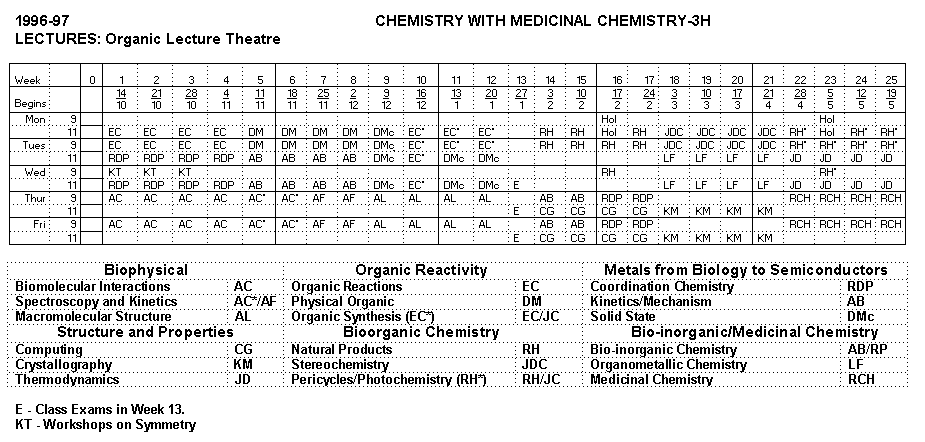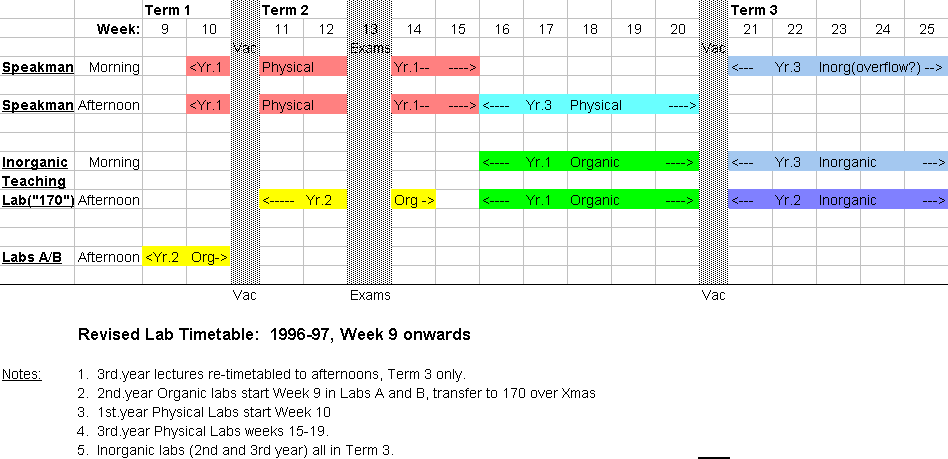
Chemistry with Medicinal Chemistry-3H

Class Head: Prof. D.J. Robins
CLASS HANDBOOK
 Revised Teaching Lab schedule now available.
Revised Teaching Lab schedule now available.
1996-1997 Chemistry with Medicinal Chemistry -3H Course Heads: Prof D J Robins/Dr P H McCabe; Dr F C Boyle Course Secretary: Miss Elizabeth McLean CONTENTS Administration Booklist Lecture Timetable Tutorial and Laboratory Timetable CHEMISTRY WITH MEDICINAL CHEMISTRY -3H SESSION 1996-7 The Class Heads are Prof D J Robins/Dr P H McCabe/Dr F C Boyle. Tel: 0141-330-4378 (direct). ABSENCE FROM CLASSES In the event of illness or other reasons for absence, Dr McCabe, tel: 0141-330-6128 (direct), should be notified as soon as possible and, if appropriate, a relevant medical certificate should be submitted to Mrs E Hughes, Room A4-04. TERM 1 Lectures: Monday - Friday 11am, Tuesdays and some Wednesdays 9am, in the Organic Lecture Theatre. Tutorials in Organic weekly, Wednesday 10am. Physical and Inorganic on alternating weeks, either Monday or Thursdays, 10am. Laboratories: Organic, weeks 1-8 inclusive, Monday and Wednesday, 1-5pm, Tuesday and Thursdays, 1-4pm. Attendance at Alchemist Club talks and local section RSC lectures, Thursdays, 4pm, is highly encouraged. TERM 2 AND 3 Lecture times and location as Term 1. Tutorials as Term 1. Laboratories: Inorganic, weeks 11-17 inclusive, Monday, Tuesday and Wednesday, 1-5pm, Thursdays, 1-4pm: Physical, weeks 18-25 inclusive, Monday, Tuesday and Wednesday, 1-5pm. CLASS CERTIFICATES Admission to the Degree Examinations is contingent on the award of Class Certificate. In order to be certain of a Class Certificate, you are required to: (a) regularly attend lectures and tutorials, and (b) regularly attend laboratory sessions. Assessment of practical work throughout the session will contribute 10% to the final assessment for the session with the written examination contributing 90%, and (c) perform satisfactorily in the class examinations. EXAMINATIONS Three class examinations, to prepare you for the Degree Examination, will be held in week 13. The Degree Examination consists of three three-hour written papers, on Organic, Physical and Inorganic Chemistry. It will be at the Level-3 (Special) standard, and the relevant number of course units is 120. The examiners may, at their discretion, award passes at Level-3 (80 course units) to candidates whose performance does not merit a pass on the Special standard. To gain admission to the Final Year, you must have an additional 220 course units, and must have performed the work of the Level-3 course in your principal subject to the satisfaction of the Head of Department. In Chemistry, this is normally a pass in Chemistry at the Level-3 (Special) standard. Additionally, 10% of your June performance will be carried forward to contribute to your Final Examinations. 1996-97 CHEMISTRY-3H - SUMMARY OF LECTURE COURSES The course has been substantially changed this year. It has been divided into six units, each of which comprises three 8 lecture courses. The course titles are listed below. The Physical Degree Examination paper will be based on units A and D, the Organic paper on units B and E and the Inorganic paper on units C and F. A. Biophysical A1. Biomolecular Interactions Dr Cooper A2. Spectroscopy and Kinetics Drs Cooper & Freer A3. Macromolecular Structure Dr Lapthorn B. Organic Reactivity B1. Organic Reactions Dr Colvin B2. Physical Organic Dr Morris B3. Organic Synthesis Drs Colvin & Carnduff C. Metals from Biology to Semiconductors C1. Coordination Chemistry Dr Peacock C2. Kinetics/Mechanism Dr Benniston C3. Solid State Dr McComb D. Structure and Properties D1. Computing Dr Gilmore D2. Crystallography Dr Muir D3. Thermodynamics Dr Dymond E. Bioorganic Chemistry E1. Natural Products Dr Hill E2. Stereochemistry Prof. Connolly E3. Pericycles/Photochemistry Drs Hill & Carnduff F. Bio-inorganic/Medicinal Chemistry F1. Bio-inorganic Chemistry Drs Benniston & Peacock F2. Organometallic Chemistry Dr Farrugia F3. Medicinal Chemistry Dr Hartley POLICY ON SUMMATIVE ASSESSMENT All feedback on coursework used in assessment, including mid-year class exam/class test marks and laboratory grades, is strictly provisional for your guidance only, and is subject to ratification by the Board of Examiners and external examiners at the end of the academic year. You must retain all copies of assessed work (lab notebooks, exam scripts, etc.) and have them available for inspection by the examiners if requested at the end of the year. (You will be given reasonable advance warning should this be required.) CHEM-3H & CHEM-4H: RECOMMENDED TEXTBOOKS FOR SESSION 1996-97 MOLECULAR MODELS: It is essential that all students possess a set of molecular models. Orbit Molecular Building System: Organic and Inorganic Chemistry Individual Set, Cochrane, £10.75. (Approx) INORGANIC CHEMISTRY: It is essential that all students have a copy of: Inorganic Chemistry, Second Edition, D F Shriver, P W Atkins and C H Langford, Oxford University Press, 1994, £19.50. The following four books are strongly recommended for purchase: Basic Solid State Chemistry, A R West,John Wiley, £18.50. Structural Methods in Inorganic Chemistry, Second Edition, E A V Ebsworth, D W H Rankin and S Craddock, Blackwell, £19.95. Particularly useful for laboratory and tutorial work and helpful in problem solving. The Mechanisms of Reactions at Transition Metal Sites, R A Henderson, Oxford Science Publications, £5.99. Biocoordination Chemistry, D E Fenton, Oxford Sciences Publications, £5.99. ORGANIC CHEMISTRY:Students should already own Organic Chemistry, Fifth Edition, R J Morrison and R N Boyd, Allyn/Bacon, £24.00 OR Organic Chemistry, Third Edition, J McMurry, Brooks/Cole, £23.50. It is essential that all students have a copy of: Spectroscopic Methods in Organic Chemistry, Fourth Edition Revised, D H Williams and I Fleming, McGraw-Hill, £15.95. PHYSICAL CHEMISTRY: It is essential that all students have a copy of: Physical Chemistry, Second Edition, R A Alberty and R J Silbey, John Wiley, £21.00. NOTE: ALL PRICES ARE SUBJECT TO CHANGE BY PUBLISHERS AT ANY TIME. REFERENCE BOOKS HELD IN THE CHEMISTRY BRANCH LIBRARY INORGANIC CHEMISTRY Advanced Inorganic Chemistry, Fifth Edition, F A Cotton and G Wilkinson, John Wiley, £26.50. Some Thermodynamic Aspects of Inorganic Chemistry, Second Edition, D A Johnson, Cambridge U.P., £37.50. (Out of Print) Inorganic Chemistry, Third Edition, A G Sharpe, Longman, £19.99. Orbitals, Terms and States, M Gerloch, John Wiley, out of print. A small book which should help to clarify difficulties in understanding the nature of orbitals, terms and states. Relevant to many courses in Inorganic and Physical Chemistry. A Guide to Modern Inorganic Chemistry, S M Owen and A T Brooker, Longman, £12.99. Sets out to answer the questions that are asked most often by students. A revision aid. ORGANIC CHEMISTRY A Guidebook to Mechanism in Organic Chemistry, Sixth Edition, P Sykes, Longmans, £15.99. Some Modern Methods of Organic Synthesis, Third Edition, W Carruthers, Cambridge U.P., £19.95. Guidebook to Organic Synthesis, Second Edition, R K Mackie, D M Smith and R A Aitken, Longman, £16.99. Organic Synthesis: The Disconnection Approach, S. Warren, John Wiley & Sons, 1994, £15.95. Physical Organic Chemistry, N S Isaacs, Longman, £27.99. Secondary Metabolism, Second Edition, J Mann, Claredon Press, Oxford, £22.50. Heterocyclic Chemistry, T L Gilchrist, Longman, (Out of print). Non-Benzenoid Conjugated Carbocyclic Compounds, D Lloyd, Elsevier. (Out of print) Molecular Biology of the Gene, Volumes 1, & 2 Fourth Edition, J D Watson et al., Benjamin//Cummings, £37.95. Advanced Organic Chemistry - Reactions, Mechanisms and Structure, FourthEdition, J March, John Wiley, £24.95. The definitive reference work which is an excellent and complete source of references. Organic Chemistry - A Guide to Common Themes, T Kitson, Edward Arnold, £13.99. A very readable overview of concepts and reaction types. Medicinal Chemistry 2nd Edition, C R Ganellin and S M Roberts, Academic Press. £29.95 Hardback (Soft cover may be available). Organic Chemistry of Drug Design and Drug Action, R B Silverman, Academic Press. PHYSICAL CHEMISTRY Crystal Structure Analysis: a Primer, Second Edition, J P Glusker and K N Trueblood, O.U.P., £23.50. Symmetry and Structure, S F A Kettle, John Wiley, £15.95. Biophysical Chemistry, C R Cantor and P R Schimmel, W H Freeman & Co. £33.95. Physical Biochemistry, D Friefelder, W H Freeman & Co. £29.95. Enzyme Structure and Mechanism, A Fersht, W H Freeman & Co. £19.95. Protein Structure - a practical approach, T E Creighton, IRL Press. £22.50. Introduction to Protein Structure, C Branden and J Tooze, Garland Publishing. £40.43. Physical Chemistry, Fourth Edition, P W Atkins, OUP, £24.00.

(CMC lectures listed for revised Term 3 only)


 Return to Undergraduate Courses .
Return to Undergraduate Courses .